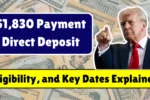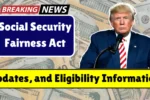The Canadian government has introduced a new financial relief initiative called the Working Canadians Rebate (WCR), which is set to offer a $250 one-time payment to working Canadians. This rebate is slated for distribution in the spring of 2025. It aims to assist individuals who worked in 2024 and earned up to $150,000, providing support to help manage everyday expenses. However, while the government has announced the rebate as part of a broader economic aid package, the legislation to make it official is still pending.
Despite the delay in the program’s rollout, fraudsters are already exploiting the uncertainty surrounding the WCR. Scammers are sending deceptive emails, texts, and phone calls, attempting to trick Canadians into providing personal or financial information by claiming they can gain early access to the rebate. In response, the Canada Revenue Agency (CRA) has issued a warning urging people to be cautious.
Canada CPP Payment Released
The Canada Pension Plan (CPP) has recently released a payment of $1,306. Check your eligibility for pension benefits and important dates.
OAS Payment Date
The Old Age Security (OAS) payment for November 2024 has been disbursed, but has there been any increase in the amount?
What is the Working Canadians Rebate?
Announced on November 21, 2024, by the Liberal government, the Working Canadians Rebate (WCR) is designed to provide financial relief to Canadians facing economic challenges. The rebate, worth $250, will be available to eligible workers who earned up to $150,000 in 2024. The government estimates that approximately 18.7 million Canadians could benefit from this rebate.
While part of a larger economic relief plan that also includes a temporary GST holiday, the WCR’s legislative approval is still pending. A delay in passing the necessary legislation has led to disagreements in Parliament, especially from NDP Leader Jagmeet Singh, who has voiced concerns over the exclusion of certain vulnerable groups. As of now, no payments have been issued, and Canadians are being reminded that the rebate will only be distributed once the legislation is formally enacted.
How Scammers are Exploiting the Situation
In light of the delay, scammers are taking advantage of the uncertainty around the WCR. Fraudulent messages are circulating via email, text, and phone calls, claiming to offer early access to the rebate in exchange for personal information or payments. These scammers often use high-pressure tactics, falsely promising quick processing or threatening negative consequences to convince people to provide sensitive details.
CRA’s Official Warning
The Canada Revenue Agency (CRA) has clarified that no payments for the Working Canadians Rebate are currently being processed. The rebate will only be issued once the necessary legislation is passed. The CRA has also emphasized that Canadians should be cautious of any communication claiming to offer immediate access to the rebate.
- No payments yet: The rebate is not yet available, and Canadians should disregard any communication suggesting otherwise.
- No unsolicited messages: The CRA does not send unsolicited emails or texts asking people to complete forms or click on links to claim the rebate.
- No fees: The CRA will never ask individuals to pay fees or provide personal details via email or text in exchange for receiving the rebate.
How to Recognize Scam Attempts
The CRA has outlined several key signs to help Canadians identify potential scams:
- Urgent requests for payment: Scammers often pressure victims by claiming immediate payment is required to receive the rebate or avoid penalties. The CRA does not operate in this manner.
- Unusual payment methods: Be wary of requests to pay via gift cards, cryptocurrencies, Interac e-transfers, or prepaid credit cards. These are not legitimate payment methods for CRA transactions.
- Aggressive language: Fraudulent messages may use threats of arrest or deportation if payment isn’t made. The CRA does not use such tactics.
- In-person meetings: Scammers may ask to arrange in-person meetings to collect payment. The CRA never requires in-person interactions for rebate processing.
What to Do if You Suspect a Scam
If you receive a message or phone call that claims to be from the CRA and mentions the Working Canadians Rebate or asks for personal details, follow these steps:
- Do not respond: Avoid clicking links, downloading attachments, or providing any personal information.
- Verify the message: If you’re unsure whether a communication is legitimate, visit the official CRA website or contact them directly using verified contact details.
- Report the scam: If you suspect you’ve encountered a scam, report it to the CRA’s Anti-Fraud Centre. The CRA encourages all Canadians to report fraudulent activity to protect others.
How the CRA Will Distribute the Rebate
Once the legislation for the $250 rebate is passed, the CRA will begin distributing the funds automatically. Eligible individuals will receive their payments directly via direct deposit or cheque. No forms, applications, or additional actions will be required from recipients.
The CRA will never request sensitive personal information, such as social insurance numbers or banking details, via email or text. Canadians should ensure they are only communicating through official CRA channels to avoid falling victim to fraud.
While the Working Canadians Rebate holds promise for providing financial relief to millions, scammers are already trying to exploit the delay. By staying informed and cautious, Canadians can protect themselves from fraud and ensure they receive their legitimate rebate when it becomes available.





